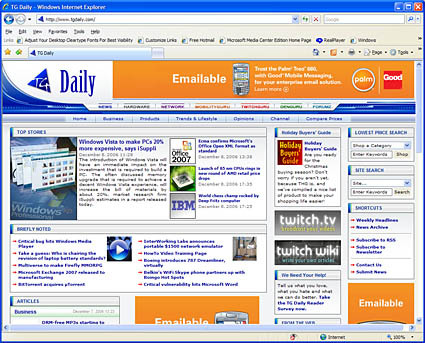TG Daily Top-10: Technology disappointments of 2006
Get Tom's Hardware's best news and in-depth reviews, straight to your inbox.
You are now subscribed
Your newsletter sign-up was successful
#9 Microsoft Internet Explorer 7
How's your browsing lately? Just assuming that you recently updated your web browser, from IE6 to IE7, how much better is your browser today?
Actually, your browser may be much better than before, at least if you have not been using Firefox. But the real question is: Is it good enough?
I will avoid writing a complete review of the new browser on this page. You can find plenty of tests and comparisons of features on pretty much every computer magazine site. But let me mention that Microsoft has done a nice job in terms of modernizing the graphical user interface, adding new features such as tabbed browsing as well as integrating search and news feeds. The big news with IE7 was its enhanced security (we'll forget here that the first IE7 security hole was found not even one day after the browser's debut) and anti-phishing filter.
The release of IE7 was somewhat reminiscent of IE4 back in 1997, which brought a revolutionary feature set for its time. In combination with the browser's integration in Windows, the software was powerful enough to crush the then dominant Netscape Communicator browser. A few years later, Microsoft found itself in a similar situation with Firefox, which apparently surprised Microsoft with a lean and functional interface in 2004. IE6 basically stood still since its initial release in 2001.
It was clear that Microsoft needed a revolutionary browser with IE7 to fend off Firefox - a browser as revolutionary as IE4 in 1997. Given the fact that Microsoft, a company with huge developer resources, had five years to develop a next-generation browser, the outcome is disappointing. Yes, the browser represents a solid overhaul, but most of the features available in IE7 have been available for some time in Firefox. There are very few new features in IE7 that Firefox 2.0 cannot offer.
The IE7 has a sleek new design. But is it enough to beat Firefox?
Admitted, the preference for one or the other browser is highly subjective, but IE7 somewhat lacks the innovative spirit we have seen in earlier versions of the software and in the first versions of Firefox. IE simply needs completely new functionality that sets it apart from its rival.
Examples? Installing security updates still requires too many steps - why can't this happen without user intervention? Where is the integration of Microsoft's various search engines into the browser? Wouldn't it be great to have a map or book search feature right in the browser? I'm sure you can name a few more features that would simplify your web browsing experience.
The fact is that IE7 has just caught up with Firefox 2.0, not more and not less. But that may not be enough to recapture the market shares it has lost in the past two years. The next Firefox (3.0) already popped up as an alpha version on the Internet - if Microsoft needs as long for IE8 as it did for IE7, the choice for a web browser in 2007 and beyond is clear.
Get Tom's Hardware's best news and in-depth reviews, straight to your inbox.
Tom's Hardware is the leading destination for hardcore computer enthusiasts. We cover everything from processors to 3D printers, single-board computers, SSDs and high-end gaming rigs, empowering readers to make the most of the tech they love, keep up on the latest developments and buy the right gear. Our staff has more than 100 years of combined experience covering news, solving tech problems and reviewing components and systems.

